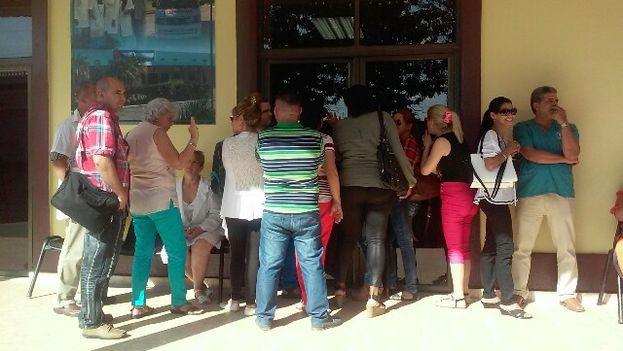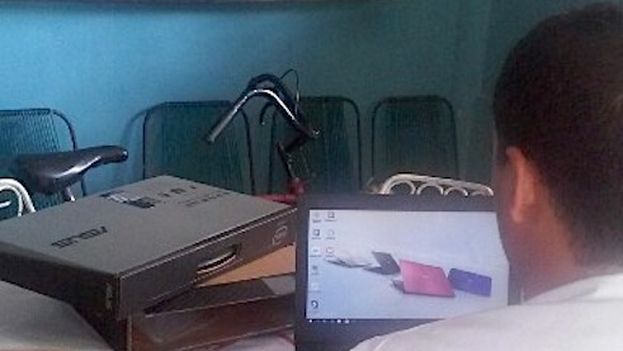
![]() 14ymedio, Bertha Guillen, Candelaria, 19 January 2017 – “After a long wait I have my laptop,” affirms Amaury Rodriguez, a doctor who is a general practitioner in Guanajay, Artemisa, with satisfaction. The laptops are being distributed at subsidized prices to the public health sector in Artemisa, an initiative that is not without its critics.
14ymedio, Bertha Guillen, Candelaria, 19 January 2017 – “After a long wait I have my laptop,” affirms Amaury Rodriguez, a doctor who is a general practitioner in Guanajay, Artemisa, with satisfaction. The laptops are being distributed at subsidized prices to the public health sector in Artemisa, an initiative that is not without its critics.
At a cost of 668 Cuban pesos, about 25 dollars, and without the ability to pay in installments, the computers are allocated to any doctor who obtained a diploma before the end of 2015. The list of beneficiaries also includes those who have served on a medical mission abroad.
“My salary is 1,295 CUP from which they deduct 5% for the payment of social security and any other invention that arises, which leaves me approximately 1,240 CUP,” Rodriguez told this newspaper. The health professional estimates the cost of the laptop to be “more than half” of his monthly salary.
The approximate take-home pay of doctors is around 1,240 Cuban pesos, meaning the subsidized the laptop costs more than half a month’s salary
Nevertheless, in spite of the juggling he has to do to make ends meet with the new expense, Rodriguez is content. “It’s about time they remembered us,” he says, referring to the medical profession.
Cuban Public Health employs a total of 262,764 people, of whom 87,982 are doctors, according to data from the 2015 Statistical Yearbook.
The doctors earn the highest wages in the country, equivalent to a total of between 50 and 70 dollars per month, but also have to deal daily with a working day marked by very long hours, the material deficiencies that affect the hospitals, and the dissatisfaction of their patients.
In Artemis, the physicians can acquire a laptop at a store that caters to public health workers, located in the provincial capital, a situation that has led to long lines outside the premises, where impatience mixes with the desire to obtain the desired piece of technology as soon as possible.
The store’s administrator, Roberto Gallardo, told the provincial newspaper, El Artemiseño, that “once the sale of the laptops is concluded,” there will be offerings for “uniformed nurses, lifeguards, anti-mosquito campaigners and physiotherapists.”
Gallardo, who works for the Provincial Logistics Company (Epola), said they are trying to pay more attention to health care workers and so among the things that might be offered are, “home appliances, and supplies for personal grooming and the home.”

One of the workers from the store told 14ymedio that the sale of computers will continue throughout January, although they initially planned to end it in the first half of the month. “So far we have sold, in Artemisa, San Cristóbal, Candelaria and Guanajay, but we still have towns to cover,” explains the employee.
“We started with the hospitals and then the doctors in the clinics, which is a large number,” said the employee, who preferred to remain anonymous.
The computers distributed are mostly ASUS brand, from Taiwan, and have a two-year warranty, but only on condition that the user does not change the version of the Microsoft Windows operating system that comes with the computer.
The price of one of those notebooks in the informal market is between 200 and 300 Cuban convertible pesos (equivalent to about the same in dollars), so some doctors are not waiting to resell them to get cash, and others to buy a machine with better features.
Rubén, a computer engineer in the area, points out that other little-known brands are also being sold. In his opinion, “the computers are only a token,” because the quality is not good and he considers the integrated battery a limitation, since it makes it difficult to replace it in case of damages.
The price of one of these laptops in the informal market oscillates between 200 and 300 CUC, so some doctors aren’t waiting to resell them for cash
Ana, a doctor in the provincial hospital is not satisfied. “We Cuban doctors are accustomed to surviving from the charity and gratitude of our patients,” she complains. “The bad conditions under which we work are a secret to no one.”
Nor is she satisfied with the quality of the computer compared to “the millions of dollars the Government earns through the sale of medical services abroad.” The official Granma newspaper itself has revealed that each year Cuba collects more than 8.2 billion CUC (roughly equivalent to the same in dollars) through “exporting health services.”
Roberto, another doctor in Artemisa, does not share the opinion of his colleague. “I’m happy with mine, and I can connect via Wi-Fi,” he tells this newspaper. “Maybe the machine is not the best, but it’s cheaper than you can buy on the street, and anyway, I didn’t have one,” he enthused.
However, the physician is more cautious about the other possible benefits announced for the sector. “The story that they are going to give us access to the internet is a trap.” He also distrusts being the idea that he will be able to obtain an affordable car and sees it as something unattainable “for those who have to go to work every day on a bicycle.”
